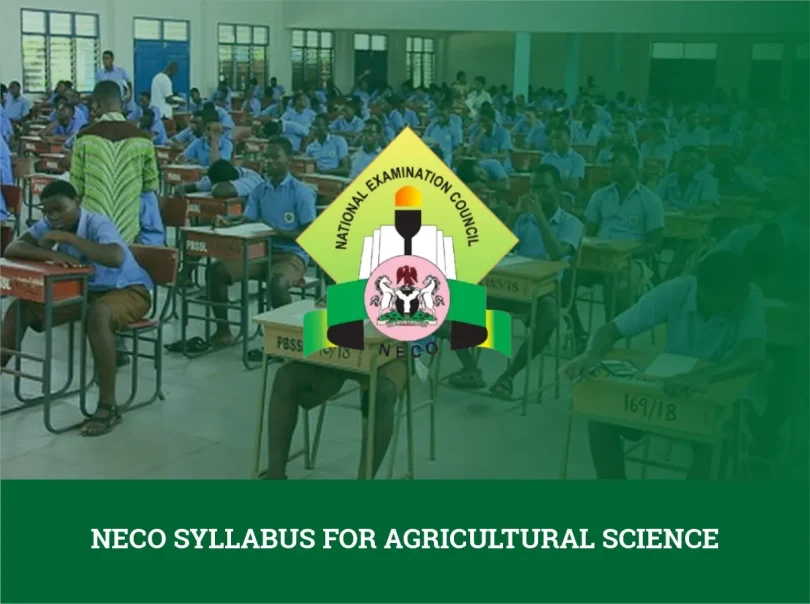The National Examinations Council (NECO) syllabus is available for all subjects, including Agricultural Science. The NECO Syllabus for Agricultural Science is an important tool that clearly lists all the topics you need to study for the exam. It helps you understand what the exam will cover so you can prepare well and avoid wasting time on less important areas.
All candidates who use this syllabus will have a clear sense of direction in their revision. It allows you to focus on the key topics that will appear in the exam, making your study time more effective. Tutors can also use the NECO Syllabus for Agricultural Science to guide their students, ensuring they concentrate on the right areas and improve their chances of success.
With the NECO June/July examinations starting soon, it is important to get hold of this syllabus and start covering the topics listed. Below, you will find the full NECO Agricultural Science syllabus to help you prepare better.
NECO Syllabus For Agricultural Science
A. Basic Concepts
| Topic | Content Summary |
|---|---|
| Meaning and Importance of Agriculture | Definition, branches, and relevance to individuals, communities, and national development. |
| Problems of Agricultural Development and Solutions | Issues: land tenure, finance, transport, storage, etc. Solutions to each problem. |
| Subsistence vs. Commercial Agriculture | Definitions, differences, advantages/disadvantages, and common problems. |
| Government Roles in Agricultural Development | Provision of credit, subsidies, education, extension, and policy support. |
| Role of NGOs | Definition, functions, and examples of NGOs aiding agriculture. |
| Agricultural Laws and Reforms | Land tenure systems, Land Use Act, and review of past/present agri-programmes (e.g., OFN, ADP). |
B. Agricultural Ecology
| Topic | Content Summary |
|---|---|
| Agricultural Ecology | Meaning, components (biotic/abiotic), and interactions in ecosystems. |
| Land and Its Uses | Definitions, agricultural/non-agricultural uses, and characteristics. |
| Factors Affecting Land Availability | Physical, economic, and socio-cultural factors (e.g., land tenure, pollution, population). |
| Agro-Allied Industries | Relationship between agriculture and industries; raw materials and employment. |
| Environmental Factors | Climatic, biotic, and edaphic factors affecting production. |
| Rock Formation | Types and how they are formed: igneous, sedimentary, metamorphic. |
| Soil Formation and Profile | Influencing factors, weathering types, and soil horizons. |
| Soil Types & Properties | Soil types, components (air, water, nutrients), and physical/chemical properties. |
| Plant Nutrients | Macro/micro nutrients, deficiency symptoms, replenishment, and nutrient cycles (N, C, H₂O, P). |
| Organic Agriculture | Meaning, importance, and practices. |
| Irrigation | Definition, types (overhead, surface), pros/cons, and challenges. |
| Drainage | Meaning, types, benefits, and limitations. |
| Agricultural Pollution | Causes (chemicals, oil spills, waste), and its effects on productivity. |
C. Agricultural Engineering / Mechanization
| Topic | Content Summary |
|---|---|
| Simple Farm Tools | Types: hoe, cutlass, shovel, spade; care and maintenance. |
| Farm Machinery | Machines like tractors, shellers, incubators, dryers, milking machines, harvesters. |
| Tractor Implements | Ploughs, harrows, ridgers, planters, sprayers, and their uses. |
| Maintenance and Safety | Servicing, checking oil/water, safety guidelines. |
| Agricultural Mechanization | Meaning, operations, pros/cons, and future prospects. |
| Farm Power | Sources: human, animal, mechanical, electrical – and their merits/demerits. |
| Farm Surveying | Meaning, tools, uses, importance. |
| Farm Planning | Definition, planning factors (size, soil, market), and significance. |
| Farmstead Planning | Layout design, importance, and considerations for site selection. |
Did you find this post helpful? If you have any questions, feel free to ask in the comments, and we will respond shortly. Please share this post with other candidates who might be interested in the syllabus. Don’t forget to check our page for more syllabi on other NECO subjects.







Leave a Comment